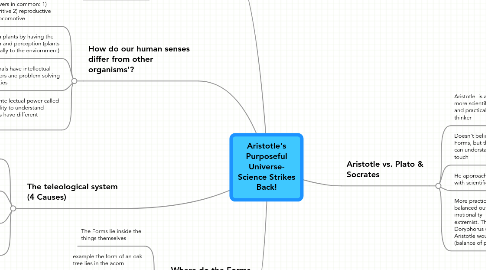Aristotle's Purposeful Universe- Science Strikes Back!
作者:Meital A

1. Aristotle the Biologist
1.1. "All men by nature desire to know. An example is the delight we take in our senses."
1.2. Why would I have my eyes if I wasn't supposed to use them for my benefit? We were given our senses to understand the world, to gain knowledge, to find the big T
1.3. Nothing in nature is random- everything has purpose
2. How do our human senses differ from other organisms'?
2.1. All living things share three powers in common: 1) nutritive 2) reproductive 3) locomotive
2.2. Animals differ from plants by having the power of sensation and perception (plants respond mechanically to the enviornment)
2.3. Animals have intellectual powers and problem solving abilities
2.4. HUMANS have a special intellectual power called REASON, which is the ability to understand universals--> thus, humans have different CAUSES
3. The teleological system (4 Causes)
3.1. 1) Material Cause- the material from which things are made
3.2. 2) Formal Cause- the shape or form that a thing must take in order to be recognized
3.3. Efficient Cause- the actual force used to make the thing
3.4. Final Cause- what is the ultimate PURPOSE of the thing
4. Where do the Forms reside?
4.1. The Forms lie inside the things themselves
4.2. example:the form of an oak tree lies in the acorn
4.3. Everything we see is part of a teleological (goal-oriented system)-
4.4. the forms are present in our physical world--potentiality
5. Aristotle vs. Plato & Socrates
5.1. Aristotle is a more scientific and practical thinker
5.2. Doesn't believe in the world of the Forms, but thinks that everything we can understand is everything we can touch
5.3. He approaches philosophy with scientific method
5.4. More practical in a sense that he balanced out rationality with irrationality- GOLDEN MEAN- not an extremist. Think: Plato would love Doryphorus (mathematical perfection). Aristotle would love the Parthenon (balance of perfect and imperfect)


